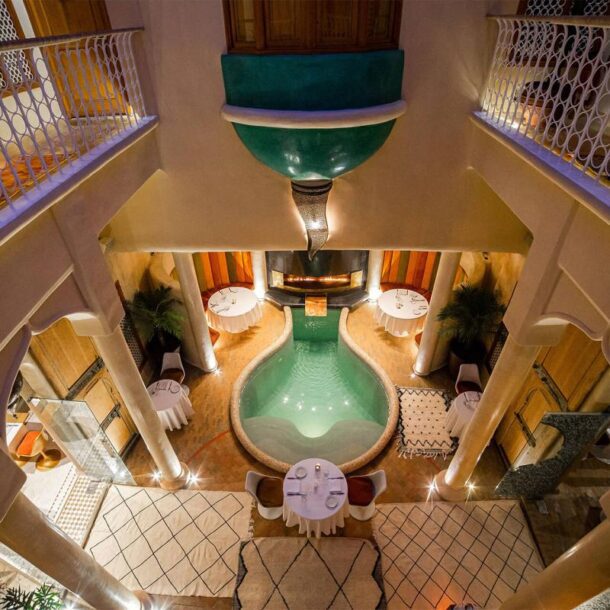

Close

Morocco, a land of vibrant colors, fragrant spices, and breathtaking landscapes, is not just known for its stunning beauty but also for its unparalleled tradition of hospitality. Rooted in centuries-old customs and values, traditional Moroccan hospitality, often expressed through the term « Atithi Devo Bhava » (the guest is God), is a heartfelt and genuine practice that makes visitors feel like honored guests. In this article, we delve into the rich tapestry of Moroccan hospitality, exploring its customs, rituals, and what makes it truly special.
A Warm Welcome
The Moroccan people are renowned for their warm and gracious hospitality. Upon entering a Moroccan home, riad, or even a local shop, you are likely to be greeted with a sincere and heartfelt « Marhaba » (welcome). This initial greeting sets the tone for a memorable experience filled with warmth and hospitality.
Mint Tea: The Symbol of Welcome
One of the most iconic symbols of Moroccan hospitality is the offering of mint tea, known as « atai » or « whiskey berbère. » This aromatic tea is brewed with fresh mint leaves and generous amounts of sugar, creating a sweet and refreshing drink. The pouring of tea is a ritual in itself, with hosts skillfully pouring the tea from a height to create frothy bubbles. This gesture not only signifies welcome but also demonstrates the care and attention to detail that Moroccans extend to their guests.
Sharing Meals: A Bonding Experience
Food plays a central role in Moroccan hospitality. When you are invited into a Moroccan home, it is common to be treated to a lavish meal, often consisting of multiple courses. Traditional dishes like tagines, couscous, and pastilla are lovingly prepared and served with pride. The act of sharing a meal with guests is a way to build connections and strengthen bonds.
Moroccan Riads: A Haven of Hospitality
Staying in a riad, a traditional Moroccan house or palace with an interior courtyard, is an excellent way to experience Moroccan hospitality firsthand. Riad owners and staff often go above and beyond to ensure that guests feel like a part of their extended family. You can expect personalized service, attentive staff, and an inviting ambiance that allows you to relax and unwind.
Socotra Tree: The Tree of Life
A symbol of life and protection in Moroccan culture, the Socotra tree is often found in the courtyards of homes and riads. Its shade and presence are said to provide protection to guests from the harsh desert sun, emphasizing the importance of the guest’s well-being in Moroccan hospitality.
Gift-Giving: A Sign of Respect
Gift-giving is a common practice in Moroccan hospitality. When visiting someone’s home, it is customary to bring a small gift, such as pastries, dates, or a box of chocolates, as a token of appreciation. Hosts also often give parting gifts to their guests as a sign of gratitude.
Parting Words: « Saha ftourkoum »
As you bid farewell to your Moroccan hosts, you may hear the phrase « Saha ftourkoum, » which means « May your iftar (evening meal during Ramadan) be pleasant. » This farewell, often accompanied by well-wishes, reflects the Moroccan tradition of expressing good wishes for one’s guests.
Conclusion
Traditional Moroccan hospitality is not just a cultural practice; it’s a way of life deeply ingrained in the hearts of the Moroccan people. It’s a reminder that, no matter where you come from, when you visit Morocco, you are not just a traveler; you are a cherished guest. So, as you journey through this enchanting country, savor the warm greetings, share in the delicious meals, and embrace the profound generosity and kindness that make traditional Moroccan hospitality an unforgettable part of your travel experience.
© Copyright 2024 © Maison MK | Made by Le Carré Digital